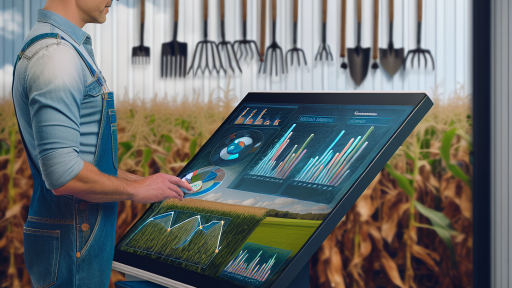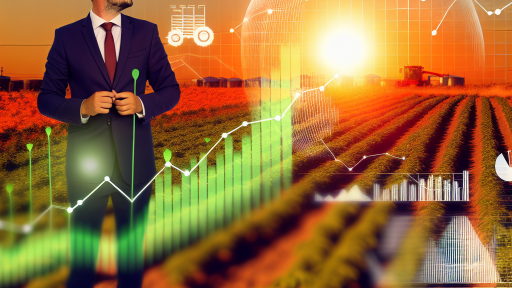Impact of Climate Change on Crop Yields and Farming Practices
Effects on Crop Yields
Climate change significantly impacts crop yields across the globe.
Rising temperatures cause stress to various crops.
Moreover, altered precipitation patterns disrupt water availability.
Farmers face increased challenges in planting and harvesting.
Consequently, food security becomes a growing concern.
Regions with stable climates experience unexpected shifts.
For instance, wheat yields can decline due to heat stress.
In contrast, some regions may see improved crop growth.
This variability necessitates adaptive farming strategies.
Adapting Farming Practices
Farmers must adapt to changing environmental conditions.
Innovations in technology play a crucial role in adaptation.
Precision agriculture offers targeted resource management.
This approach optimizes inputs like water and fertilizers.
Additionally, crop rotation enhances soil health and resilience.
Cover cropping provides ground cover and prevents erosion.
Transform Your Agribusiness
Unlock your farm's potential with expert advice tailored to your needs. Get actionable steps that drive real results.
Get StartedFurthermore, integrating pest management reduces reliance on chemicals.
Farmers collaborate with experts to implement these strategies.
Policy and Community Support
Government policies play a pivotal role in supporting farmers.
Subsidies for sustainable practices encourage innovation.
Community programs facilitate knowledge sharing among farmers.
Moreover, research institutions provide valuable insights.
Training initiatives help cultivate climate-smart techniques.
Such support systems are essential for long-term sustainability.
Ultimately, a united effort can combat climate-related challenges.
The Role of Technology and Innovation in Modern Agriculture
Advancements in Agricultural Technology
Technological advancements significantly impact modern agriculture.
Farmers use drones to monitor crop health effectively.
GPS technology allows for precise planting and harvesting.
Additionally, sensors help in managing irrigation more efficiently.
Innovative Farming Techniques
Vertical farming is revolutionizing food production in urban areas.
This practice optimizes space while minimizing resource usage.
Hydroponics and aeroponics provide alternatives to traditional soil-based agriculture.
These methods enhance yield and reduce reliance on pesticides.
Data-Driven Decision Making
Data analytics play a crucial role in decision-making for farmers.
Farmers analyze soil health data to improve crop management.
Big data helps predict market trends and consumer preferences.
Consequently, farmers can adapt strategies for better profitability.
Impact on Sustainability
Technology promotes sustainability in various agricultural practices.
Precision agriculture minimizes waste and conserves resources.
Moreover, renewable energy sources are increasingly used on farms.
Showcase Your Farming Business
Publish your professional farming services profile on our blog for a one-time fee of $200 and reach a dedicated audience of farmers and agribusiness owners.
Publish Your ProfileFarmers are adopting sustainable practices driven by innovation.
Challenges and Considerations
Despite benefits, challenges persist in adopting new technologies.
The cost of advanced equipment can be prohibitive for some farmers.
Additionally, training is necessary for effective technology implementation.
Thus, access to resources and education remains vital for success.
Economic Policies and Subsidies Affecting Agricultural Markets
Overview of Economic Policies
Economic policies significantly influence agricultural markets across the globe.
Governments implement these policies to stabilize food prices and ensure farmer profitability.
Moreover, these policies can impact trade relationships between countries.
Types of Subsidies
Subsidies come in various forms, each serving distinct purposes.
Direct payments provide farmers with a set amount of money for their production efforts.
Price supports help guarantee a minimum price for crops, providing a safety net.
Furthermore, crop insurance subsidies mitigate risk amid unpredictable weather patterns.
Impact of Policies on Market Dynamics
Economic policies can change market dynamics systematically.
For instance, they can affect supply and demand by incentivizing production.
Additionally, policies can shape consumer behavior by altering food prices.
Consequently, these effects create fluctuations in market stability.
Global Trade Considerations
Global trade agreements also play a crucial role in agricultural markets.
Policies often facilitate or hinder international trade of agricultural products.
Tariffs can impact the pricing of imported goods, influencing domestic markets.
Therefore, countries must navigate complex trade regulations to remain competitive.
Case Studies of Effective Policies
Several countries have successfully implemented effective agricultural policies.
The Netherlands showcases a model of innovative farming supported by subsidies.
In the United States, the Farm Bill outlines significant agricultural support initiatives.
These case studies illustrate the variability and impact of policy decisions.
Challenges and Future Directions
Despite positive impacts, challenges persist in agricultural policy frameworks.
Environmental concerns, such as climate change, demand adaptive policy measures.
Furthermore, achieving equitable access to subsidies remains a hurdle.
As a result, policymakers must consider sustainability in future agricultural initiatives.
You Might Also Like: Data-Driven Market Analysis for Smart Farming
Global Trade Dynamics and Their Influence on Local Farmers
The Role of International Trade in Agriculture
International trade plays a vital role in shaping agricultural markets.
It connects local farmers to global consumers.
This influence often affects pricing and availability of crops.
For instance, high global demand can drive up local prices.
Conversely, increased imports may lower prices for local farmers.
Farmers must adapt to these shifting market conditions.
Trade Agreements and Market Access
Trade agreements impact how farmers access international markets.
Free trade agreements often reduce tariffs on agricultural products.
This can lead to increased competition but also access to larger markets.
For example, the United States-Mexico-Canada Agreement (USMCA) opened new avenues for farmers.
This agreement benefits crops like corn and soybeans.
Showcase Your Farming Business
Publish your professional farming services profile on our blog for a one-time fee of $200 and reach a dedicated audience of farmers and agribusiness owners.
Publish Your ProfileAs a result, local farmers can sell to a broader audience.
Influence of Global Commodity Prices
Global commodity prices significantly affect local agricultural economics.
When prices rise on the international market, local farmers benefit.
Higher prices can increase profits, enabling investment in technology.
On the flip side, falling global prices can reduce local farmers’ revenues.
Farmers may struggle to cover production costs during these periods.
Sustainability Concerns and Consumer Preferences
Consumer interest in sustainability is reshaping agricultural practices.
Increasing demand for organic produce influences farming methods.
This trend encourages local farmers to adopt more sustainable practices.
Farmers can capture higher prices by catering to this market.
Consequently, sustainability is becoming a key factor in farmer profitability.
The Impact of Technology on Market Entry
Technological advancements are changing how farmers access markets.
Online platforms enable farmers to reach consumers directly.
These platforms can increase sales and reduce reliance on middlemen.
Furthermore, data analytics helps farmers make informed planting decisions.
As a result, technology enhances competitiveness in agricultural markets.
You Might Also Like: Navigating Commodity Price Fluctuations in Farming
Consumer Trends and Preferences Shaping Agricultural Production
Shift Towards Organic Products
Consumers increasingly prefer organic products over conventional ones.
This shift is driven by concerns about health and the environment.
Many people believe organic farming practices are safer.
Additionally, there is a growing awareness of sustainable agricultural methods.
As a result, farmers are adapting their production styles accordingly.
Demand for Local Produce
There is a rising demand for locally sourced food items.
Consumers value freshness and quality, which local farms can provide.
Furthermore, supporting local farmers strengthens community ties.
This trend encourages shorter supply chains, reducing transportation emissions.
Consequently, farmers focus more on direct sales and farmers’ markets.
Health Conscious Choices
Health consciousness significantly influences consumer purchasing decisions.
More people prioritize nutrition and ingredient transparency today.
They seek products with fewer additives and preservatives.
Therefore, producers are responding by developing healthier options.
This includes offering gluten-free, vegetarian, or allergen-free products.
Environmental Sustainability Concerns
Environmental issues increasingly affect consumer choices in agriculture.
Many shoppers are aware of the impacts of climate change.
This awareness drives interest in eco-friendly farming practices.
As a result, sustainable agriculture is becoming a market differentiator.
Farmers adopting these techniques benefit from positive consumer perceptions.
Technology and Innovation in Marketing
Technological advancements are changing how consumers interact with agriculture.
Online platforms facilitate easier access to farm-fresh products.
Social media plays a crucial role in promoting agricultural innovations.
Showcase Your Farming Business
Publish your professional farming services profile on our blog for a one-time fee of $200 and reach a dedicated audience of farmers and agribusiness owners.
Publish Your ProfileMoreover, consumers now frequently research products before purchasing.
This trend affects how farmers market their goods effectively.
Social Responsibility and Ethical Consumption
Consumers care about the ethical practices of brands they support.
They prefer companies that prioritize fair labor practices.
Additionally, ethical sourcing of materials is increasingly important.
Farmers must now demonstrate their commitment to social responsibility.
This shift demands transparency in agricultural production chains.
Explore Further: Analyzing Market Demand for Modern Farmers

Sustainability and Organic Farming Practices in Market Trends
Importance of Sustainable Practices
Sustainability is becoming a critical focus in agriculture.
Consumers increasingly demand food produced with ethical methods.
This demand drives market trends towards more sustainable practices.
Moreover, sustainable practices contribute to environmental conservation.
Farmers recognize that these practices enhance soil health.
Healthy soil improves crop yields over time.
Organic Farming Growth
Organic farming has seen substantial growth in recent years.
Many farmers transition to organic methods to meet consumer demand.
This shift aligns with rising awareness of health benefits.
Organic produce often fetches higher prices in the market.
It also appeals to environmentally conscious consumers.
Consequently, organic certification has become a sought-after credential.
Challenges in Sustainable Agriculture
Despite its benefits, sustainable agriculture faces challenges.
Higher upfront costs can deter some farmers from transitioning.
Additionally, organic farming can lead to lower yields initially.
However, long-term benefits often outweigh these short-term challenges.
Education and support for farmers are necessary for successful transitions.
Market Impact of Sustainable Practices
The rise of sustainable farming practices influences market dynamics.
Retailers increasingly prioritize sourcing sustainably produced goods.
This shift can result in a rise in brand loyalty among consumers.
Furthermore, products labeled as organic often dominate market shares.
Consequently, companies that embrace sustainability can enjoy competitive advantages.
Investing in sustainable practices can lead to long-term profitability.
Uncover the Details: How Vertical Farming Is Disrupting Traditional Agribusiness Models
The Importance of Supply Chain Management in Agriculture
Defining Supply Chain Management
Supply chain management is critical in agriculture.
It encompasses the entire process from production to consumption.
Strong management ensures efficient movement of goods.
Moreover, it enhances the quality of agricultural products.
Impact on Food Security
Effective supply chains support food security at multiple levels.
They decrease food loss during storage and transportation.
This efficiency helps maintain stable food prices.
Additionally, improved supply chains ensure timely deliveries.
Showcase Your Farming Business
Publish your professional farming services profile on our blog for a one-time fee of $200 and reach a dedicated audience of farmers and agribusiness owners.
Publish Your ProfileTechnological Integration
Technology plays a vital role in modern supply chains.
For instance, data analytics improves decision-making.
Farms utilize software to track yields and market demands.
Automated systems streamline operations and reduce costs.
Sustainability Considerations
Supply chain management addresses sustainability challenges.
It promotes eco-friendly practices throughout agriculture.
For example, reduced waste lowers environmental impact.
Furthermore, sustainable sourcing enhances consumer trust.
Collaboration Among Stakeholders
Collaboration is essential in agricultural supply chains.
Farmers, suppliers, and retailers must work together.
Partnerships lead to shared resources and knowledge.
Effective communication aids in adapting to market changes.
Emerging Markets: Opportunities and Challenges for Farmers
Overview of Emerging Markets
Emerging markets present significant growth potential for agriculture.
These markets often have rising incomes and changing consumer preferences.
Farmers can take advantage of new opportunities in these regions.
Opportunities for Farmers
Farmers can access new customer bases in emerging markets.
Additionally, increased foreign investment offers new resources.
Technology adoption can enhance productivity and efficiency.
Moreover, local partnerships can facilitate market entry.
Access to New Customer Bases
Emerging markets often have changing dietary preferences.
Consumers increasingly seek fresh and diverse food options.
This trend creates demand for various agricultural products.
Increased Foreign Investment
Foreign investors are recognizing the potential in agriculture.
Investment can provide farmers with access to capital and technology.
Furthermore, it fosters infrastructure development in rural areas.
Challenges in Emerging Markets
While opportunities exist, farmers must also navigate challenges.
Market access can be complicated due to regulations and logistics.
Additionally, competition from local producers may be strong.
Farmers face risks related to climate change and resource availability.
Market Access and Regulations
Navigating local regulations can be cumbersome for farmers.
Compliance with safety and quality standards is essential.
Logistical issues can impede product distribution and sales.
Competition and Resource Risks
Farmers may find it challenging to compete with established local businesses.
These competitors often understand the market better.
Moreover, climate change impacts weather patterns and crop yields.
Strategies for Success
Farmers can employ several strategies to succeed in emerging markets.
Adopting sustainable practices can enhance long-term profitability.
Investing in local knowledge and partnerships is vital.
Utilizing technology and innovative solutions can increase resilience.
Adopting Sustainable Practices
Sustainable farming methods improve soil health and biodiversity.
Showcase Your Farming Business
Publish your professional farming services profile on our blog for a one-time fee of $200 and reach a dedicated audience of farmers and agribusiness owners.
Publish Your ProfileThey also align with global trends toward environmentally friendly practices.
This alignment can attract eco-conscious consumers in new markets.
Investing in Local Knowledge
Understanding local customs and preferences is crucial for success.
Engaging with local communities builds trust and partnerships.
Furthermore, leveraging local expertise can enhance market entry.
Additional Resources
U.S. Agricultural Trade – USDA ERS
USDA Science and Research Strategy, 2023-2026: Cultivating …




